Water is important. It makes about 70 percent of our body, and it is integral to every bodily function.
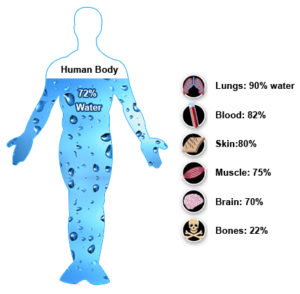 Our brain and heart are each made up of 73 percent water and our lungs are 83 percent water.
Our brain and heart are each made up of 73 percent water and our lungs are 83 percent water.
Water lubricates the joints, prevents the skin from drying up or potentially breaking out, and is essential for muscle use.
Take away water and blood pressure decreases, leading to weakness, dizziness and fatigue.
Nearly every one of your body’s systems require water. As such, every single disease can be positively affected by proper hydration. So we can all agree that drinking water is important.
But when a client recently asked me if drinking more water could help her lose weight I had to do a little research.
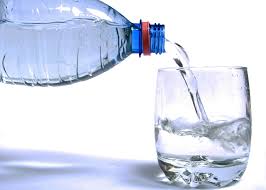 In fact, studies show that drinking water can indeed help you lose weight! That’s because drinking water can increase the total number of calories you expend throughout the day.
In fact, studies show that drinking water can indeed help you lose weight! That’s because drinking water can increase the total number of calories you expend throughout the day.
A study of overweight and obese children had a 25% increase in energy expenditure simply after drinking cold water. Another study of overweight women examined the effects of increasing water intake to over 1 liter per day. Those who increased their water intake lost an average of 4.4 lbs over 12 months with no other lifestyle change.
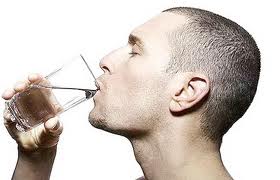 Drinking water before meals can decrease appetite.
Drinking water before meals can decrease appetite.Studies of older adults have show that drinking water before each meal may increase weight loss up to 4.4 lbs. over a 12 week period. In another study of middle aged overweight and obese participants, those who drank water before meals lost 44% more weight than the control group who did not drink water before meals.
Another study showed that drinking water before breakfast reduced total calorie consumption during the meal by about 13%. Although this may be beneficial for middle aged and older people, these results did not cross over to younger adults and children.
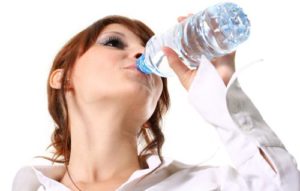 Drinking Water instead of other beverages reduces total calorie consumption and weight gain
Drinking Water instead of other beverages reduces total calorie consumption and weight gainObservational studies show that people who drink mostly water have up to 9% (or 200 calories) lower calorie intake per day.
One study sought to get 2nd and 3rd graders to drink more water and less soda by installing more drinking fountains in 17 schools. After one year, the risk of obesity at the school had been reduced by whopping 31%! Considering the exploding rates of obesity and diabetes in our children and teens, we should take these findings very seriously.
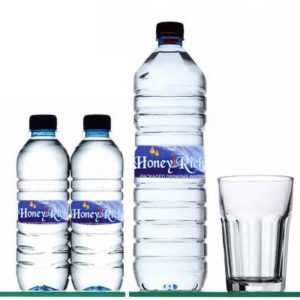 So, how much water should we be drinking?
So, how much water should we be drinking?
Have you ever heard of the 8 X 8 rule? The rule that we should all be drinking eight 8 ounce glasses of water per day? That’s over 2 liters of water per day. Where did this rule come from?
A scientist, Frederick Stare, may have first coined this in the mid 70’s when he recommended drinking six to eight 8 ounce glasses of water per day, but he was talking about TOTAL water consumption, including water that came from food sources including milk, juice, coffee, tea, fruits and vegetables.
The real answer to this question is that it may be very different from person to person. A lot of factors can influence our individual need for water:
- Our activity level. (the more we move and sweat, the more fluid we need)
- Our climate. (People in the coldest and warmest climates need more water)
- Our health (Underlying health issues and medications may influence the way our body stores and uses water)
- Our age (this factors in with activity level for younger folks, but elderly people often need to pay more attention to drinking enough water as they may lose their natural thirst and may be taking medications including diuretics)
We know it’s important, but how do we remember to drink more water?
Try to drink first thing in the morning and then every hour or so throughout the day. Eating plenty of fresh fruits and vegetables will also help you stay better hydrated (and healthy). Avoid sugary sodas, sports drinks and caffeinated beverages, and be mindful not to overdo it alcohol, which, can have a diuretic effect if you drink more than one or two drinks.
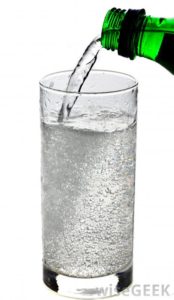 Are certain kinds of water better for us than others?
Are certain kinds of water better for us than others?
Plain water is still the best to drink, but often folks seek out other options because they’ve lost their sense of taste for plain water,
Some turn to carbonated waters which, unlike sodas and colas which are associated with low bone mineral
density in women, the same was not true for plain carbonated drinks. They don’t contain phosphorous which increases calcium loss through the kidneys.
What about Antioxidant waters, like BAI?
Although these drinks may contain some vitamin C and electrolytes, the artificial flavorings and sweetners trump any real benefit. You can get the same of better benefit from simply eating an orange or banana.
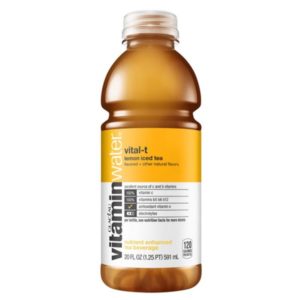 Vitamin Waters?
Vitamin Waters?
Pretty much the same thing; it’s much better to get your vitamins and electrolytes from eating fruits and veggies and skipping the artificial flavors and sugars.
What about coconut water?
Because it contains some carbohydrate and potassium (in fact it contains more potassium than four bananas), coconut water has been touted by athletes as the Natural Sports Drink. And it contains much less sugar and sodium than Gatorade and Powerade. Go for the coconut water if you like the taste.
The bottom line: Water makes up a good percent of our body and is important in sustaining the health of just about every major organ in our bodies. Don’t wait to feel thirsty to drink as many of us are walking around in a constant state of dehydration.
Drink a glass of water before you eat in the morning, and carry a glass bottle (no plastic please) around with you throughout the day. You can even set an alarm on your watch or calendar to remind you to drink. Once you begin to drink water on a regular basis, you will recapture your natural thirst, increase your energy and may even save a few calories per day which can add up to weight loss over time.
I’ll sure drink to that!
 Our brain and heart are each made up of 73 percent water and our lungs are 83 percent water.
Our brain and heart are each made up of 73 percent water and our lungs are 83 percent water. In fact, studies show that drinking water can indeed help you lose weight! That’s because drinking water can increase the total number of calories you expend throughout the day.
In fact, studies show that drinking water can indeed help you lose weight! That’s because drinking water can increase the total number of calories you expend throughout the day. Vitamin Waters?
Vitamin Waters? 




Leave a Reply